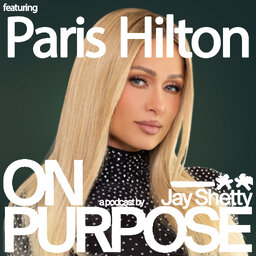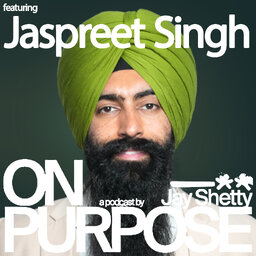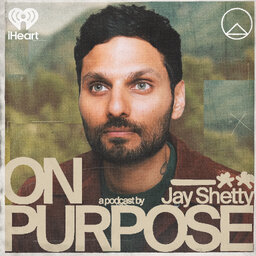Elliot Page ON: How to Turn Self-Hate Into Self-Love & Navigating Societal Gender Norms
Can self-hate be turned into self-love, and if so, where does this transformation start?
How can we replace self-criticism with affirmations and begin prioritizing self-care?
Today, I have something truly special to share with you on the On Purpose podcast. We're about to dive deep into the incredible journey of Elliot Page, whose story is not just a memoir but a testament to the power of self-discovery and authenticity.
Elliot Page is an Academy Award-nominated actor, director, producer, writer, and a New York Times bestselling author known for his indelible on-screen presence in both tentpole and art house films. Today we are talking about his memoir Pageboy which became an instant bestseller.
Starting with a detailed exploration of life-changing memories, we journey alongside Elliot through a life-long experience that's beautifully reflected in this memoir. It's a story of resilience and growth, a reminder that we all have the capacity to overcome challenges and find our true selves.
Elliot's story sheds light on the importance of not letting societal conditioning dictate who we are. We'll explore how being true to yourself can lead to living the life you've always wanted. From struggles to self-discovery, we will discover the impact of authenticity and self-acceptance and how these can help anyone take pivots at the most crucial moments.
And amidst it all, we'll touch on topics like community support, transitioning resources, and how parents can empower their children to express themselves.
In this interview, you’ll learn:
How to let go of self hate
How to appreciate your authenticity
How to develop self love
How to find your own voice
The importance of community support
The challenges when transitioning
How to deal with unsupportive people
This episode is not just about one person's journey; it's about the universal themes of self-love, acceptance, and the incredible strength of the human spirit.
With Love and Gratitude,
Jay Shetty
What We Discuss:
00:00 Intro
01:58 Elliot's Memory Exploration
03:46 Pageboy: A Memoir
06:16 Breaking The Mold Of Conditioned Reactions
07:41 Living Your Dream Life
09:28 Fighting to Function In Your Own Pace
10:26 Let People Be Themselves
13:08 How Transition Shapes Your Profession and Life
15:15 The Positives of Being Grounded And Present
18:20 The Significance of Community Support
20:16 Resources for Transitioning Individuals
23:19 How Parents Can Aid In Self-Expression
25:13 Misconceptions on Youth and Trans Health
28:43 Trans Men On Conversations About Masculinity
32:11 Empathetic Conversations With Other Trans People
38:09 Lessening the Burden of Feeling Alone
42:51 Connecting Through Stories
44:29 Balancing Alone Time And Forming Relationships
47:30 Living A Life With Limited Resources
51:40 Biographies And Intriguing Lives
53:04 Having A Moment Of Self Love
56:14 Elliot Page on Final Five
Episode Resources:
Elliot Page | Twitter
Elliot Page | Instagram
Elliot Page | Facebook
If you are interested in learning more in the topics we discussed today, below is a book list curated by Elliot Page:
A Trans Man Walks Into a Gay Bar, Harry Nicholas
Amateur, Thomas Page McBee
Bellies, Nicola Dinan
He/She/They, Schuyler Bailar
Miss Major Speaks, Miss Major and Toshio Meronek
None of the Above, Travis Alabanza
Redefining Realness, Janet Mock
Surpassing Certainty, Janet Mock
The Risk it Takes to Bloom, Raquel Willis
The Transgender Issue, Shon Faye
Transgender History, Susan Stryker
We Both Laughed in Pleasure, Lou Sullivan
In 1 playlist(s)
On Purpose with Jay Shetty
My name is Jay Shetty, and my purpose is to make wisdom go viral. I’m fortunate to have fascinating …Social links
Follow podcast
Recent clips

PARIS HILTON: The REAL Story Beyond the Headlines, Fame, Misconceptions, and The Journey to FINALLY Reclaim Her Narrative
1:07:01

Jaspreet Singh: Why Most People Stay Broke (Follow THIS 7-Step System to FINALLY Stop Living Paycheck-to-Paycheck!)
1:19:03

Feel Stuck, Confused, or Behind? Use THIS Blueprint and Completely Transform Your Life in ONE Year!
23:16
 On Purpose with Jay Shetty
On Purpose with Jay Shetty